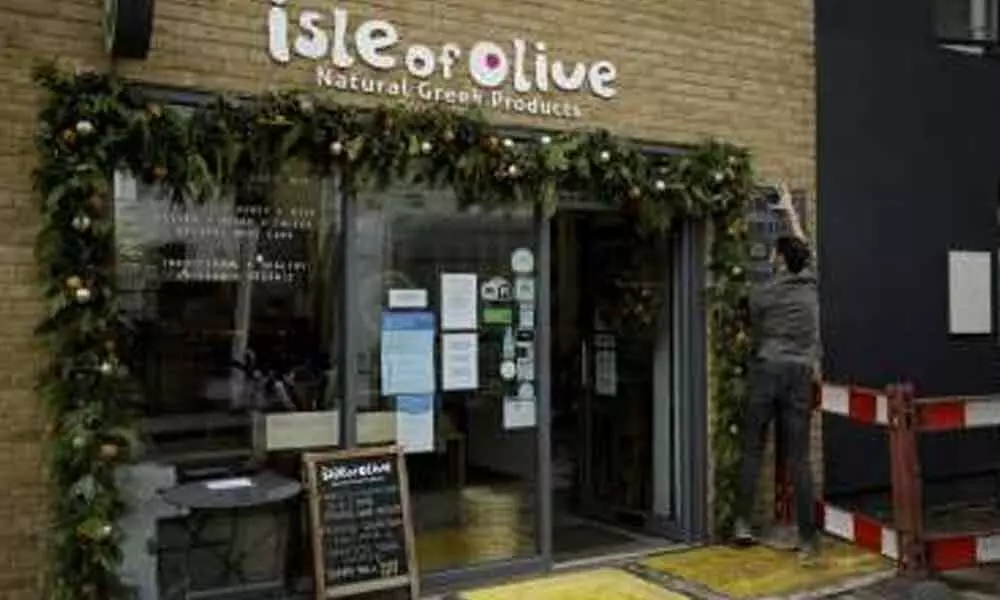On London street, virus forces small shops to adapt or close

On London street, virus forces small shops to adapt or close
In late October, Matthew Jones was enjoying a rare “bit of normality” at his London barber shop in a year that has been short on that.
London: In late October, Matthew Jones was enjoying a rare "bit of normality" at his London barber shop in a year that has been short on that.
He was cutting hair and laughing with colleagues — when the news landed that the business would have to close for the second time. Jones, 43, endured 15 weeks without any income after the three Sharpes barber shops he co-owns were forced to shut in the spring as the government imposed restrictions to slow the spread of the coronavirus. The shops, including a tiny one in east London's trendy Hackney neighbourhood, had been open for four months when Prime Minister Boris Johnson ordered a new lockdown. "It was a body blow for everyone that works here," he said. "You're just building up your business again, trying to get back to a normal lifestyle. And then all of a sudden it's all taken away." As in much of Europe, the United Kingdom saw a sharp resurgence of COVID-19 infections this autumn, and officials imposed a second round of severe restrictions.
The suffering has been especially acute in the U.K., where more than 57,000 people have died in Europe's deadliest outbreak and the economy has plunged into the worst recession on record. While small businesses all over the world are struggling as the virus forces many to close outright while also remaking consumer habits, many in the U.K. are facing the double whammy of the pandemic and the economic uncertainty caused by Britain's exit from the European Union. Editor's note — Small businesses around the world are fighting for survival amid the economic fallout from the coronavirus pandemic. Whether they make it will affect not just local economies but the fabric of communities. Many British businesses managed to survive the spring lockdown with generous aid from the government, including grants like the 10,000-pound (GBP 13,300) one Jones received and a program that pays a portion of wages to workers whose employers are struggling.
The measures have helped keep the unemployment rate relatively low at 4.8 per cent — though it has been rising and is forecast to hit 7.5 per cent next spring. The latest round of restrictions could pack a bigger punch, coming smack in the crucial weeks ahead of Christmas. Even before the second lockdown was announced, a survey conducted by Britain's Office for National Statistics showed that one in seven U.K. companies reported having "little or no confidence" they would survive the next three months. Jones estimates that the pandemic wiped out 60% of his income this year. With his shops closed, the single dad, who has a 10-year-old daughter, is doing odd jobs on building sites — and praying that business will return enough to ease the pain once restrictions lift on December 2. The five other barbers who work in his shops are self-employed, and trying to scrape by as well.
"It could be really tough if it carries on," Jones said, as he put up Christmas lights in his empty shop on Hackney's Broadway Market. Hackney has seen steady gentrification in the past two decades. Located in London's historically gritty East End, the borough was once known as the home of a stretch dubbed "Murder Mile," but Hackney is now filled with trendy bars and expensive apartments. Broadway Market itself is lined with some 60 small shops, cafes and restaurants, and before COVID-19 hit, the street would throng with locals and tourists coming for the hugely popular weekend market. These days, some shops are doing better than others, but everyone is scrambling to adapt. Jane Howe, who has run Broadway Bookshop since 2005, said the weekends would often get so busy that her shop would take in thousands of pounds in sales per day on the back of 7.99-pound books.
For a shop that relies heavily on foot traffic, the cycles of coronavirus restrictions have been hard. In June, Howe launched a website for the first time. Even once her doors reopened, the tiny space meant she couldn't welcome back her usual crowds. Sales from the website don't come close to making up for the in-person ones she's lost — especially during the crucial Christmas period, when her shop typically rakes in a third of its annual sales. "We're missing out on the impulse buys, the 'sweetie by the till factor,'" she said.














